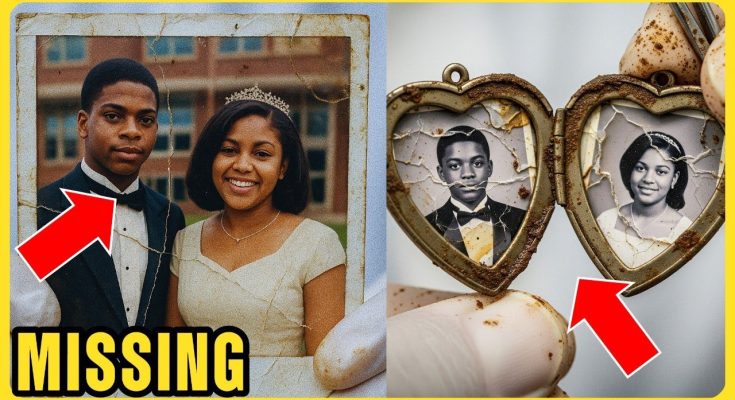A Black Teen Couple Vanished in 1991 — 10 Years Later Their Locket Was Found in a Well | HO!!

CYPRESS BEND, MISSISSIPPI — On a humid spring night in 1991, two teenagers left their high school prom and disappeared into the deep silence of the Mississippi delta. For a decade, the official story was that Darnell Washington and Mon’Nique Baptiste were just another pair of runaways, chasing dreams out of reach.
But when a rusted locket surfaced from the bottom of an abandoned well, the truth about what happened that night — and the town that tried to forget — finally began to come to light.
Prom Night, 1991: The Last Drive
Darnell “D” Washington and Mon’Nique “Mo” Baptiste were the kind of couple who made teachers smile and underclassmen sigh. He was captain of the debate team, she led the school choir.
Both had college acceptance letters, and both wore matching halves of a heart-shaped locket — a symbol of a love that seemed destined to outlast the cotton fields of Boulevard County.
On prom night, after the last slow dance faded from the gym, D and Mo drove to their favorite spot by the Yazoo River. They parked under the cypress trees, the radio humming quietly, and talked about the future. But their night was interrupted by the arrival of a pickup truck carrying three white teens from Planters Ridge — a wealthy enclave with a reputation for trouble.
The confrontation that followed was tense: taunts, threats, and an ominous pursuit down County Road 12. D and Mo made it back toward town, but by morning, they were gone.
Their parents, Gloria Washington and Clarence Baptiste, knew something was wrong. They pleaded with the Boulevard County Sheriff’s Office to investigate, but their fears were brushed aside. “Runaways,” muttered the desk sergeant. “Probably sleeping off somewhere.” Detective Henshaw, the lead investigator, dismissed their concerns: “Prom’s over. Pressure’s on. Maybe they decided to go off script for once.”
There was no Amber Alert. No search party. No questioning of the Planters Ridge boys. Just silence.
The Disappearance: A Town Looks Away
Within days, the community mobilized. Church groups and neighbors canvassed roadsides and woods. Volunteers rowed boats up the river, praying for any sign of the missing teens. But the police kept their distance, and the white students from Planters Ridge were never questioned.
The weeks turned to months. The red Pontiac was never found. The locket was missing. The police released no statements, held no press conferences. The case faded from the white pages of the local newspaper, but in Cypress Bend’s Black neighborhoods, the pain took root.
Parents warned their children not to linger after school. Whispers circulated about the Coington boys from Planters Ridge — especially Brent Coington, the councilman’s son, who had a history with Darnell.
By 1993, the families filed lawsuits against the sheriff’s department for failure to investigate. The case was dismissed. In the years that followed, hope withered.
Gloria stopped attending church prayer circles; Clarence drank alone on the porch. Mo’s father nailed her Easter photo to the front of their house, with a sign beneath it: “Still missing.”
2001: The Locket in the Well
A decade later, Cypress Bend had all but forgotten. The disappearance was a ghost story — until a 16-year-old named Devon Miller, exploring an abandoned farmstead on a dare, found something near an old, sunken well: a rusted chain with a heart-shaped locket, engraved with “DW” and “MB.” Inside, the faded photos of D and Mo stared back through a crust of mud.
Devon ran back to town. The locket was placed under the harsh lights of the evidence room. For the first time in ten years, the town remembered how to listen.
Sheriff Tyrone Maxwell, only a rookie when the teens vanished, now led the investigation. He sealed off the Lancaster property and called in forensic teams from Jackson.
The well was drained, revealing two sets of young, intertwined skeletal remains, a faded red cloth, D’s class ring, Mo’s choir bracelet, and a rusted license plate from D’s Pontiac. The car itself was never recovered, likely stripped and dumped in the river or burned.
The medical examiner confirmed what everyone already knew: the remains belonged to Darnell Washington and Mon’Nique Baptiste. The trauma on the bones — skull fractures, defensive wounds — indicated murder.

A Decade of Neglect
The rediscovery of the locket and the bodies forced Cypress Bend to confront its own failures. Sheriff Maxwell pored over the original case file: no witness interviews, no follow-up on the Planters Ridge boys, no canvassing of County Road 12. One thick black marker line crossed out “Planters Ridge” in an old officer’s notes.
Maxwell tracked down former classmates. Cassandra Miles, now living out of state, recalled Brent Coington and his friends “talking about teaching some punk a lesson” on prom night. Another witness, Leo Dorsy, remembered Brent boasting at a bonfire in 1994 that he’d “put that boy in his place.” But both were too afraid to testify in court.
Property records revealed that Brent’s father, Councilman Coington, had leased land adjacent to the abandoned farmstead. Brent would have known the area well, and rumors had long swirled about the Coington boys and their unchecked power.
Justice Denied, Truth Revealed
Sheriff Maxwell compiled the evidence: the remains, the locket, the trauma, the witness statements, the original police negligence, and the links to the Coington lease. But the district attorney refused to file charges. “It’s compelling,” he said, “but it’s circumstantial. No murder weapon, no DNA, no fingerprints. Any good defense lawyer will destroy this in ten minutes.”
Maxwell was furious. He couldn’t convict Brent Coington, but he could expose him. He called a press conference. Cameras flashed as he laid out the facts: the confrontation, the cover-up, the locket, the well, the system that let killers sleep soundly for a decade. He didn’t name Brent, but everyone in Cypress Bend connected the dots.
Public outrage followed. Brent lost his corporate seat and real estate deals. Protesters gathered outside his gate. But no arrest came. The law had failed, but the community would not let the story die again.
Memorial and Memory
The teens were finally laid to rest side by side in Cypress Bend Memorial Cemetery. The locket, cleaned and restored, sat in a glass case on the altar. The funeral drew the entire community, even those who hadn’t known D and Mo personally. The silence that had once protected privilege now bore witness to loss.
A memorial bench was installed at Cypress Bend High, beneath the old oak tree. Carved into the backrest: “In loving memory of Darnell Washington and Mon’Nique Baptiste, Class of ’91. A love the world tried to silence.” Students left flowers on prom week. The bench became a place for reflection, a promise that their story would not be forgotten.
The Cost of Silence
Sheriff Maxwell kept the locket in his desk, not as evidence but as memory. Anonymous letters trickled in — “We were there,” one said. A photo surfaced, showing Brent Coington and friends near the gym on prom night, D’s Pontiac in the background. Proof, but a whisper too late.
Gloria and Clarence tended the cemetery plot every Sunday. A scholarship was started in D and Mo’s names, for seniors pursuing music and debate. The locket, redrawn by a student, became the symbol of the grant: two halves of a heart, still touching.
Cypress Bend changed. The silence cracked. The story of D and Mo — denied, ignored, covered up — became a rallying cry for justice in a town that had once looked away. And though the law never delivered the justice their families deserved, the truth was finally unearthed, and the memory of two young lives, full of promise, was restored to the heart of the community.
In the end, the well did not just hold the bones of two teenagers. It held the weight of a town’s silence — and the hope that, at last, their voices would be heard.



